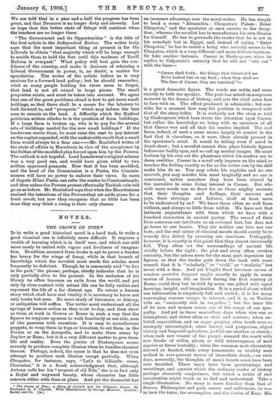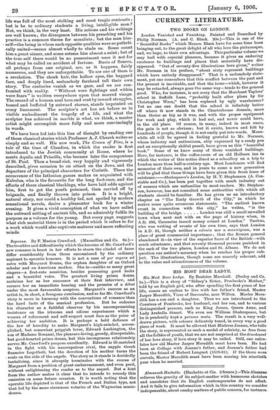NOVELS.
THE CROWN OF PINE.'
IP to write a good historical novel is a hard task, to write a good classical one is infinitely more difficult. It requires a wealth of learning which is in itself rare, and which can still More rarely be united with vigour and liveliness of imagina- tion. Erudition amassed from books is apt to prove a burden to heavy for the wings of fancy, while in that branch of knowledge which the novelist most needs the scholar must frequently be deficient., . Though.he is commonly said "to live in the past," the phrase, perhape, chiefly indicates that he is only. partially alive to the present. In the seclusion of his library he often becomes an exile from the world, and yet only by close contact With actual life can he fully realise and represent the life of a far distant age. To create a human Story which shall have real vitality it is necessary to know not only *yoke but men. No mere study of literature, or history, or antiquities will suffice. The writer must understand all the springs of human action as they exist to-day, and then show us them at work in Greece or Rome in such a way that the figures be conjures up seem to walk familiarly at our side, men of like passions with ourselves. It is easy to manufacture puppets, to wrap them in toga or himation, to set them in the Forum or on the Acropolis, • and to make them swear by Jupiter or Zeus; but it is a very different matter to give them life and reality. Even the genius of Shakespeare seemi Scarcely to produce complete illusion when be handles classical themes. Perhaps, indeed, the cause is that he does not even attempt to produce such illusion except partially. When Cleopatra, for instance,' says, "Let's to billiards : come, Charmian," it is a . frank acknowledgment that, although Antony calls her his " serpent of 'old Nile," she is in fact only a Royal 'and Wayward beauty, whose character has little concern either with time or place. And yet the dramatist has The Crown of Pine : a Story. of Corinth and the Isthmian Games. By Professor A. J. Church. With Illustrations by George Morrow. London beeley and Co. [5s.] an immense advantage over the novel-writer. He has simply to head a scene " Alexandria : Cleopatra.'s Palace : Enter .Cleopatra," and the spectator at once assents to the decep- 'tion; whereas the novelist has to manufacture his own illusion "for himself. He has to persuade the reader that he is not in his armchair but in Egypt, and, instead of saying "Enter Cleopatra," he has to create a being who actually seems to be Cleopatra, which is a very different and more delicate business. Or take another instance. Caesar in Shakespeare, when he replies to Calpurnia's entreaty that he will not "stir out" with the lines—
"Caesar shall forth : the things that threaten'd me Ne'er looked but on my back ; when they shall see The face of Caesar, they are vanished "-
is a great dramatic figure. The words are noble, and seem exactly to befit the speaker. The poet has seized on a supreme moment in the drama of history, and sets the chief actor face to face with us. The effect produced is admirable ; but con- sider for a moment how easy his position is compared with that of the story-teller. It is certainly not the story as told by Shakespeare which here rivets the attention upon Caesar, but rather the knowledge we bring with us ourselves of all that Caesar was and all that his resolve implied. The real force, indeed, of such a scene seems largely to consist in the fact that it visualises, as it were, ideas already present in the spectator's mind. It would be telling even if acted in dumb show ; but a novelist cannot thus place historic figures before our bodily eyes, and so call up mental images. He must fashion by his own art the phantoms which his readers are to deem realities. Caesar in a novel only imposes on the mind or touches the feeling exactly so far as the writer can by his skill make him do so. You may relate his exploits and no one marvels, you may murder him most tragically and no one is concerned, unless somehow they have been stirred by the narrative to some living interest in Caesar. But who with mere words can so draw for us those mighty ancients that their thoughts and feelings, their sorrows and joys, their strivings and failures, shall at least seem to be understood by us We know them often so well from without, and always so little from within. We have not that intimate acquaintance with them which we have with a hundred characters in ancient poetry. The record of their lives concerns our intellects as an external fact, but does not go home to our hearts. They stir neither our love nor our hate, and the real virtue of classical novels should surely be to remedy this defect by arousing our emotions. Unhappily, however, it is exactly in this point that they almost universally fail. They often set the surroundings of ancient life vividly before the sight ; the plot and story often awaken curiosity, but the actors seem for the most part ingenious lay figures, so that the reader puts down the book with some remark that it is "scholarly," or "vivid," or "realistic," but never with a tear. And yet Virgil's Sunt lacrimne verum et mentem mortalia tangunt ought exactly to apply to many stories of human life as lived during the first century at Rome, could they but be told by some one gifted with equal learning, insight, and imagination. It is a period about which our information is singularly full and varied; it is for many converging reasons unique in interest, and it is, as Tacitus tells us, "eminently rich in tragedies "; but the inner life of its men and women seems out of the range of our sym- pathy. And yet in those marvellous days when vice was so triumphant, and virtue often so stoic and austere; when un- belief, superstition, and an eager groping after truth were so strangely intermingled; when luxury and pauperism, abject slavery and Imperial splendour, jostled one another so closely ; when each new wearer of the purple amazed the world with new freaks of sullen gloom or wild extravagance, of mad caprice or fierce brutality ; when the common mob alternately starved or feasted, while every honourable or wealthy man walked in ever-present terror of immediate death,—on such days, assuredly, the thoughts of men's hearts must have been sore troubled. There 'must have been questionings, and wrestlings, and agonies which the ordinary reader of history perhaps obscurely conjectures, but which a writer of real imagination might teach us to feel and understand. Take a single illustration. No story is more familiar than that of Seneca. Philosopher and poet, usurer and millionaire, he was in turn the tutor, the accomplice, and the victim of Nero. His life was full of the most striking and most tragic contrasts ; but is he to ordinary students a living, intelligible man ? Not, we think, in the very least. His actions and his writings are well known; the divergence between his preaching and his practice is a common theme for moralists ; but the man him- - self—the being in whom such opposite qualities were so patheti- cally united—seems almost wholly to elude us. Some count him a great sinner, and some esteem him almost a saint; but of the true self there would be no presentment were it not for what may be called an accident of fortune. Busts of Seneca, all perhaps from one original, are, as it happens, fairly numerous, and they are unforgettable. To see one of them is a revelation. The shock hair, the hollow eyes, the haggard face, and deeply lined, melancholy forehead tell their own story. The centuries vanish as we gaze, and we are con- fronted with reality. "Without were fightings and within were fears" is written everywhere upon that marred visage. The record of a human soul torn and rent by inward struggles, tossed and buffeted by outward storms, stands imprinted on every lineament. The sculptor's art has set before us in visible embodiment the tragedy of a life, and what the sculptor has achieved in marble is what, we think, a master artist might accomplish more fully and more convincingly in words.
We have been led into this line of thought by reading one of those classical stories which Professor A. J. Church writes so simply and so well. His new work, The Crown of Pine, is a tale of the time of Claudius, in which the reader is first introduced to the Jewish community at Rome, where be meets' Aquila and Priscilla, who became later the companions of St. Paul. Then a bread-riot, very happily and vigorously described, gives occasion to an attack on the Jews, and the departure of the principal characters for Corinth. There the occurrence of the Isthmian games makes us acquainted with Eubulus, who is the favourite for the long foot-race, and the efforts of three classical blacklegs, who have laid odds against him, first to get the youth poisoned, then carried off by brigands, and finally thrown into prison. It is a bright, natural story, nor could a healthy lad, not spoiled by modern sensational novels, desire a pleasanter book for a winter evening. It gives a vivid conception of what we have called the outward setting of ancient life, and so admirably fulfils its purpose as a volume for the young. But every page suggests what rich material there is in the period which it refers to for a work which would also captivate maturer and more reflecting minds.



















































 Previous page
Previous page